IGU Biennial Symposium 2021
Human Rights and the Environment
Featured Speakers
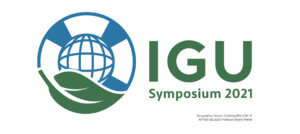
Distinguished Lecturer
Maxine Burkett
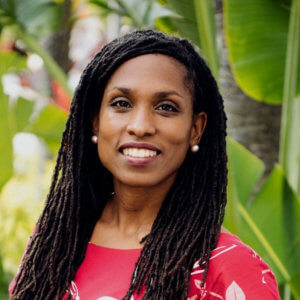
Maxine Burkett is a Professor of Law at the William S. Richardson School of Law and a Global Fellow at the Woodrow Wilson International Center for Scholars. She is also Co-Founder and Senior Advisor to the non-profit Institute for Climate and Peace.
An expert in the law and policy of climate change, she has written extensively in diverse areas of climate change law with a particular focus on climate justice—exploring policy responses to climate change’s impacts on frontline communities in the United States and globally. Professor Burkett has presented her research throughout the United States and in West Africa, the Asia-Pacific region, Europe, and the Caribbean. She has been cited in numerous news and policy outlets, including BBC Radio, the Carnegie Council for Ethics in International Affairs, the New York Times, the Washington Post, the International Business Times, and Nature Climate Change.
In 2010, Burkett served as the Wayne Morse Chair of Law and Politics at the Wayne Morse Center, University of Oregon, for the Center’s “Climate Ethics and Climate Equity” theme of inquiry. Other Wayne Morse Chairs include Charles Ogletree, Jr., Vandana Shiva, Barbara Ehrenreich, and former Senator Russ Feingold. Burkett is the youngest recipient of the Chair.
From 2009-2012, Professor Burkett served as the inaugural Director of the Center for Island Climate Adaptation and Policy (ICAP). As the Director of ICAP, she led numerous projects to address climate change policy and planning for island communities globally. She directed the completion of several adaptation related policy documents, outreach and education programs, and decision-maker support efforts for Hawai‘i and other Pacific Island nations.
In 2015, Burkett was appointed to the Federal Advisory Committee for the Sustained National Climate Assessment until it was ultimately disbanded in 2017. In the run‐up to the 2016 election, Maxine was instrumental in the creation of the country’s only municipal level office dedicated to climate resilience (and with “climate change” in the title), when City and County of Honolulu voters overwhelming approved the establishment of the Office of Climate Change, Sustainability and Resiliency. In 2018, with renowned peace educator Maya Soetoro‐Ng, Burkett co‐founded and served as the Executive Director of the Institute for Climate and Peace, which is committed to advancing effective and inclusive processes for climate resilient peacebuilding for the most vulnerable through education, collaboration, and policy transformation. Throughout 2019, the Institute crafted climate and peace-related programming for the Obama Foundation Leaders: Asia‐Pacific convening. Burkett now serves as a Senior Advisor to the Institute.
Professor Burkett received her B.A. from Williams College, which awarded her the Bicentennial Medal for Distinguished Achievement in 2016. She also attended Exeter College, Oxford University and received her law degree from Berkeley Law at the University of California, Berkeley. She served as a law clerk for The Honorable Susan Illston of the United States District Court, Northern District of California. She was a White House Intern, an Omidyar Fellow, a 2016 recipient of Pacific Business News’ 40 Under 40 award, and a 2017 awardee of Hawaii Business Magazine’s 20 for the Next 20. Professor Burkett serves on the boards of the Blue Planet Foundation, The Climate Museum, Environmental Law Alliance Worldwide (ELAW), Elemental Excelerator, and the Global Greengrants Fund. Professor Burkett is a Co-Rapporteur for the International Law Association’s Committee on International Law and Sea Level Rise. She is also a member scholar of the Center for Progressive Reform, the Lancet Commission for Reparations and Redistributive Justice, and the American Law Institute.
Documentary Film Screening and Commentary
KIVALINA: Life in the Modern Arctic
Gina Abatemarco
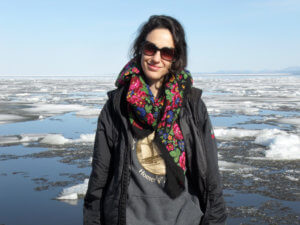 Gina Abatemarco is a Writer and Director based in Brooklyn, New York. Her films have played around the world at festivals including IDFA, Sheffield Doc Fest, Full Frame, The Royal Anthropological Institute, and The American Film Festival in Wroclaw. When not working on films, Gina is active in the sustainable food movement. She has worked for farmers and artisans at The Union Square Greenmarket, collaborated with Slow Food International, and apprenticed at the “Rome Sustainable Food Project” at The American Academy in Rome.
Gina Abatemarco is a Writer and Director based in Brooklyn, New York. Her films have played around the world at festivals including IDFA, Sheffield Doc Fest, Full Frame, The Royal Anthropological Institute, and The American Film Festival in Wroclaw. When not working on films, Gina is active in the sustainable food movement. She has worked for farmers and artisans at The Union Square Greenmarket, collaborated with Slow Food International, and apprenticed at the “Rome Sustainable Food Project” at The American Academy in Rome.
Gina’s debut feature documentary KIVALINA, capturing the intertwining plight to survive and edible traditions of an ancient Arctic culture, made its world premiere at the Berlinale Culinary Cinema. In 2016, KIVALINA was broadcast on the Emmy Award winning show America Reframed in collaboration with American Documentary. Gina’s film work has been supported by The Corporation for Public Broadcasting, The Tribeca Film Institute, The IFP Film Labs, and Vision Maker Media. In 2019, Gina Abatemarco produced Diana Kennedy Nothing Fancy, a feature documentary about the legendary Mexican cookbook author which was released by Greenwich Entertainment in 2020.
Gina is the Co-Founder of the Fusion Film Festival celebrating female filmmakers at NYU Tisch School of the Arts, where she received a B.A. from the Department of Film & Television. In 2018, Gina was awarded a Guggenheim Fellowship to develop a feature dance film in collaboration with LGBTQIA artists throughout the U.S.
Dr. Kelsey Leonard
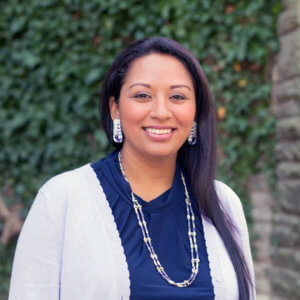 Dr. Kelsey Leonard is an Assistant Professor in the Faculty of Environment at the University of Waterloo, where her research focuses on Indigenous water justice and its climatic, territorial, and governance underpinnings. As a water scientist and legal scholar, Dr. Leonard seeks to establish Indigenous traditions of water conservation as the foundation for international water policymaking. She represents the Shinnecock Indian Nation on the Mid-Atlantic Committee on the Ocean, which is charged with protecting America’s ocean ecosystems and coastlines. She also serves as a member of the Great Lakes Water Quality Board of the International Joint Commission. Dr. Leonard received an A.B. in Sociology and Anthropology with honors from Harvard University, a MSc in Water Science, Policy and Management from the University of Oxford, a JD from Duquesne University, and PhD in Political Science from McMaster University.
Dr. Kelsey Leonard is an Assistant Professor in the Faculty of Environment at the University of Waterloo, where her research focuses on Indigenous water justice and its climatic, territorial, and governance underpinnings. As a water scientist and legal scholar, Dr. Leonard seeks to establish Indigenous traditions of water conservation as the foundation for international water policymaking. She represents the Shinnecock Indian Nation on the Mid-Atlantic Committee on the Ocean, which is charged with protecting America’s ocean ecosystems and coastlines. She also serves as a member of the Great Lakes Water Quality Board of the International Joint Commission. Dr. Leonard received an A.B. in Sociology and Anthropology with honors from Harvard University, a MSc in Water Science, Policy and Management from the University of Oxford, a JD from Duquesne University, and PhD in Political Science from McMaster University.
She has been recognized as a 30 under 30 world environmental leader by the North American Association for Environmental Education and a “Native American 40 Under 40” award recipient by the National Center for American Indian Enterprise Development. Dr. Leonard has been instrumental in safeguarding the interests of Indigenous Nations for environmental planning and builds Indigenous science and knowledge into new solutions for water governance and sustainable oceans. In collaboration with a global team of water law scholars Dr. Leonard has published in Lewis and Clark Law Review on Indigenous Water Justice and the defining international legal principle of self-determination under the United Nations Declaration on the Rights of Indigenous Peoples. Her recent scholarship explores legal personhood for water and her TEDTalk “Why lakes and rivers should have the same rights as humans” has nearly 3 million views. Dr. Leonard is a member of the Global Alliance for the Rights of Nature Academic Hub and affiliate of the Earth Law Center. She is an enrolled citizen of Shinnecock Indian Nation. Follow her on Twitter @KelseyTLeonard or visit her website at www.kelseyleonard.com.
Musical Guest
Nakho
 In a career built on reflective, deeply personal songwriting, Nahko’s extraordinary new album, ‘Take Your Power Back,’ stands as far and away his most profound, revelatory, and fully realized collection yet. Recorded in Los Angeles and Executive Produced by cut&dry, the record grapples with grief, trauma, and reconciliation, learning to face heartache head on and embrace the peace and serenity that comes with understanding and acceptance. As heavy as all that may sound, ‘Take Your Power Back’ is as uplifting and infectious as anything Nahko has ever released, blending socially conscious folk and rock with soulful, alt-R&B, genre-bending production. It’s an album of growth, of courage, of resilience. It’s a testament to the beauty and evolution that can come from fully inhabiting our pain, and it’s proof positive that our true power—spiritual, physical, and emotional—inevitably comes from within.
In a career built on reflective, deeply personal songwriting, Nahko’s extraordinary new album, ‘Take Your Power Back,’ stands as far and away his most profound, revelatory, and fully realized collection yet. Recorded in Los Angeles and Executive Produced by cut&dry, the record grapples with grief, trauma, and reconciliation, learning to face heartache head on and embrace the peace and serenity that comes with understanding and acceptance. As heavy as all that may sound, ‘Take Your Power Back’ is as uplifting and infectious as anything Nahko has ever released, blending socially conscious folk and rock with soulful, alt-R&B, genre-bending production. It’s an album of growth, of courage, of resilience. It’s a testament to the beauty and evolution that can come from fully inhabiting our pain, and it’s proof positive that our true power—spiritual, physical, and emotional—inevitably comes from within.
“I had half a year just to cultivate and create on a deeper level with this record,” Nahko explains. “I realized that I hadn’t allowed myself to explore some of the darker parts of my psyche before because I’d never had the language for it. I started going to therapy, and for the first time, I saw just how much work I needed to do. It could be painful, but sometimes you have to go through the mud to find the flowers.”
Born to a Puerto Rican/Native American mother and a Filipino father, Nahko was adopted by a white, conservative, Christian family in Oregon and raised under the name David Bell. He later learned that his birth was the result of a rape, that his biological mother had been fourteen and sold into sex work at the time he was conceived, and that his biological father had gone on to be murdered. A sixth-generation Apache, he took on the moniker of Nahko—a play on his middle name, Nahkohe-ese, which translates to Little Bear—as a way of reclaiming his roots, and in his late teens and twenties, he began traveling the country, spending stints living as far afield as Hawaii and Alaska as he wrestled with identity, purpose, and perception.
Backed by his band, Medicine For The People, Nahko released his debut album, ‘On The Verge,’ in 2011, but his true breakthrough came two years later with ‘Dark As Night.’ The record was a critical and commercial breakout, landing in the Top Ten on the Billboard Heatseekers Chart and earning the band festival slots at Outside Lands, Electric Forest, Wanderlust, Bumbershoot, and more. Over the next four years, Nahko would go on to release two more celebrated albums with his band, solidifying his reputation along the way as an outspoken activist and advocate for both social and environmental justice.
Nahko is a world-renowned musician, prolific songwriter, and active social and environmental justice advocate. He has worked alongside Winona Laduke on the board of Honor the Earth and has been heavily involved with the resistance of Indigenous peoples across North and South America, the salmon restoration in the Pacific Northwest, and an intertribal youth scholarship program which brings traditional teachings and wisdom to Indigenous youth. Nahko is a firm believer in using music as a tool of empowerment to protect and preserve all of creation.
‘Take Your Power Back’ (rel. May 15, 2020) debuted at #1 on Billboard’s Emerging Artists chart, as well as #3 on Alternative Albums and #5 on Top Albums.
Plenary Panel and Roundtable Speakers
Dr. Deepa Badrinarayana
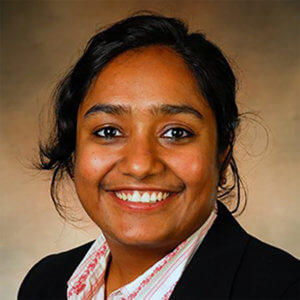 Dr. Deepa Badrinarayana is a Professor of Law at Fowler School of Law, Chapman University, where she currently teaches climate change and the law, international environmental law, and torts, among others. She has published and presented extensively on climate change and has written on the issue from international and comparative law perspectives. Her current research focuses on the intersection between climate change, human rights and constitutional rights, as well as international liability mechanisms. Prior to joining Fowler School of Law, Professor Badrinarayana was a consultant to the United Nations Global Compact, on issues of corporate voluntarism and regulations. Between 2005 and 2006, she was a Visiting Scholar at the Center for Global Legal Studies, Columbia Law School. She was also a research assistant for Professor Frank P. Grad at Columbia University School of Law, primarily researching and writing for Grad’s Treatise on Environmental Law, as well as on public health laws. Before coming to the United States, Professor Badrinarayana was a Research Officer for a World Bank Project on Environmental Capacity-Building in collaboration with the Government of India, situated at the National Law School of India University (NLSIU), in which capacity she was involved in research and advocacy, as well as training government officials and legal professionals in environmental law. Professor Badrinarayana was also part of a team that advised the Government of India on its new legislation to manage biomedical waste, an issue she worked on in India. Professor Badrinarayana holds a Doctor of Juridical Science in Environmental Law (S.J.D.) and Masters in Environmental Law (LL.M.) from Pace University Elizabeth Haub School of Law. Professor Badrinarayana is a Member of the World Conservation Union, Committee on Environmental Law.
Dr. Deepa Badrinarayana is a Professor of Law at Fowler School of Law, Chapman University, where she currently teaches climate change and the law, international environmental law, and torts, among others. She has published and presented extensively on climate change and has written on the issue from international and comparative law perspectives. Her current research focuses on the intersection between climate change, human rights and constitutional rights, as well as international liability mechanisms. Prior to joining Fowler School of Law, Professor Badrinarayana was a consultant to the United Nations Global Compact, on issues of corporate voluntarism and regulations. Between 2005 and 2006, she was a Visiting Scholar at the Center for Global Legal Studies, Columbia Law School. She was also a research assistant for Professor Frank P. Grad at Columbia University School of Law, primarily researching and writing for Grad’s Treatise on Environmental Law, as well as on public health laws. Before coming to the United States, Professor Badrinarayana was a Research Officer for a World Bank Project on Environmental Capacity-Building in collaboration with the Government of India, situated at the National Law School of India University (NLSIU), in which capacity she was involved in research and advocacy, as well as training government officials and legal professionals in environmental law. Professor Badrinarayana was also part of a team that advised the Government of India on its new legislation to manage biomedical waste, an issue she worked on in India. Professor Badrinarayana holds a Doctor of Juridical Science in Environmental Law (S.J.D.) and Masters in Environmental Law (LL.M.) from Pace University Elizabeth Haub School of Law. Professor Badrinarayana is a Member of the World Conservation Union, Committee on Environmental Law.
Rebecca Bratspies
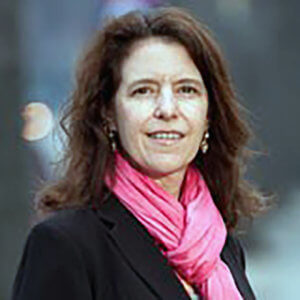 Rebecca Bratspies is a Professor at CUNY School of Law and Director of the Center for Urban Environmental Reform. An internationally recognized expert on environmental law, Professor Bratspies has written scores of law review articles, op-eds, and other publications. Her most recent book is Environmental Justice: Law Policy and Regulation. Bratspies is as an appointed member of New York City’s Environmental Justice Advisory Panel, and of EPA’s Children’s Health Protection Advisory Committee. She is a member-scholar with the Center for Progressive Reform, a core member of the Global Network for the Study of Human Rights and the Environment, and an editorial board member of the International Journal of Law in Context. She is a past member of the ABA Standing Committee on Environmental Law, Past-President of the AALS Section on the Environment, and a former advisor to the Consultative Group on Agricultural Research. A former Luce Scholar and law clerk to Judge C. Arlen Beam, she holds degrees from Wesleyan University (Biology) and the University of Pennsylvania (J.D cum laude). Her environmental justice comic books Mayah’s Lot and Bina’s Plant build environmental literacy in a new generation of environmental leaders.
Rebecca Bratspies is a Professor at CUNY School of Law and Director of the Center for Urban Environmental Reform. An internationally recognized expert on environmental law, Professor Bratspies has written scores of law review articles, op-eds, and other publications. Her most recent book is Environmental Justice: Law Policy and Regulation. Bratspies is as an appointed member of New York City’s Environmental Justice Advisory Panel, and of EPA’s Children’s Health Protection Advisory Committee. She is a member-scholar with the Center for Progressive Reform, a core member of the Global Network for the Study of Human Rights and the Environment, and an editorial board member of the International Journal of Law in Context. She is a past member of the ABA Standing Committee on Environmental Law, Past-President of the AALS Section on the Environment, and a former advisor to the Consultative Group on Agricultural Research. A former Luce Scholar and law clerk to Judge C. Arlen Beam, she holds degrees from Wesleyan University (Biology) and the University of Pennsylvania (J.D cum laude). Her environmental justice comic books Mayah’s Lot and Bina’s Plant build environmental literacy in a new generation of environmental leaders.
Esmeralda Colombo
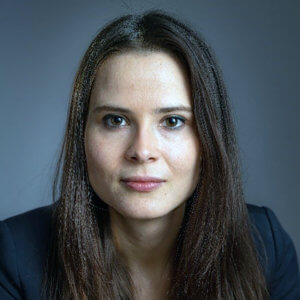 Esmeralda Colombo is a visiting professor and research fellow at the Centre for Climate and Energy Transformation at the University of Bergen, Norway. Her areas of expertise are access to climate justice, international law and comparative law, clean energy deployment and financing, and climate-related financial risk. She is a lawyer in Italy and New York State (NYSBA), and a Legal Analyst at the Climate Change Litigation Initiative (C2LI), led by Prof. Francesco Sindico. C2LI is a policy-oriented virtual platform aimed at exploring climate change litigation and provide a toolkit for understanding existing climate change litigation, as well as the reasons why some countries display little to no litigation.
Esmeralda Colombo is a visiting professor and research fellow at the Centre for Climate and Energy Transformation at the University of Bergen, Norway. Her areas of expertise are access to climate justice, international law and comparative law, clean energy deployment and financing, and climate-related financial risk. She is a lawyer in Italy and New York State (NYSBA), and a Legal Analyst at the Climate Change Litigation Initiative (C2LI), led by Prof. Francesco Sindico. C2LI is a policy-oriented virtual platform aimed at exploring climate change litigation and provide a toolkit for understanding existing climate change litigation, as well as the reasons why some countries display little to no litigation.
Prof. Colombo has delivered presentations in Europe, Asia, and the United States, and served as a visiting professor at West Bengal National University of Juridical Sciences (Kolkata, India) and a guest lecturer at the American University of Phnom Penh (Phnom Penh, Cambodia). In addition to working in law firms in Milan and Berlin, Esmeralda interned at the Columbia Center on Sustainable Investment and was research assistant to Prof. Michael Gerrard at Columbia Law School. Her publishing activity spans from climate change and environmental law to international law, U.S. environmental law, Norwegian environmental law, and Italian legal culture. For her work on international law in domestic courts, she received a prize in the prestigious Professor William R. Ginsberg Memorial Essay Contest 2016 for her article, Enforcing International Law in US Courts: The LOS Convention at Play in Kivalina, 23 ILSA Journal of International & Comparative Law 106 (2016).
Prof. Colombo received her law degree specializing in international law from the Catholic University of Milan, Italy; her LL.M. in European legal studies from the College of Europe in Bruges, Belgium; and her LL.M. from Columbia University in the City of New York, United States, where she was a Fulbright Scholar, Harlan Fiske Stone Scholar, and recipient of the Parker School Certificate in International and Comparative Law. She submitted her Ph.D. dissertation in access to climate justice at the Law Faculty of the University of Bergen, Norway, and is now completing the Certificate on Financing and Deploying Clean Energy offered by the Yale Center for Business and the Environment.
Prof. Colombo is a member of the Global Network for Human Rights and the Environment, the Women’s Energy and Climate Law Network, the World Commission on Environmental Law, and the Centre on International Sustainable Development Law. She holds a diploma in piano performance (Associated Board of the Royal Schools of Music, 2010) and has engaged with music programs to decrease individual violent behavior and inequality in underserved communities, publishing a monograph in 2014. Follow her on Twitter @ColomEsmeralda and visit https://www.researchgate.net/profile/Esmeralda_Colombo to access her publications.
Dr. Begaiym Esenkulova
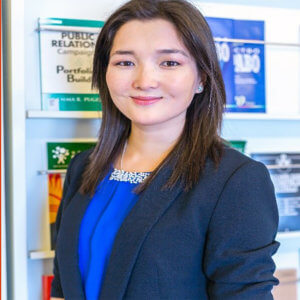 Dr. Begaiym Esenkulova is an Associate Professor in the Law Division at the American University of Central Asia in Bishkek, Kyrgyz Republic. She teaches courses related to international environmental law, investment law and sustainable development, international investment arbitration, and others. Ms. Esenkulova holds LL.M. (Summa Cum Laude) and S.J.D (Summa Cum Laude) degrees from Central European University in Budapest, Hungary. She served as a visiting scholar at Columbia Center on Sustainable Investment in 2013, a visiting doctoral research scholar at International Investment Law Center of the University of Cologne, Germany in 2015, a visiting doctoral research fellow at the Max Planck Institute for Comparative and International Private Law in Hamburg, Germany in 2015, and as a visiting postdoctoral scholar at Indiana University, Bloomington in 2018. She also served as a member of the Public Council of the State Agency on Environmental Protection and Forestry under the Government of the Kyrgyz Republic.
Dr. Begaiym Esenkulova is an Associate Professor in the Law Division at the American University of Central Asia in Bishkek, Kyrgyz Republic. She teaches courses related to international environmental law, investment law and sustainable development, international investment arbitration, and others. Ms. Esenkulova holds LL.M. (Summa Cum Laude) and S.J.D (Summa Cum Laude) degrees from Central European University in Budapest, Hungary. She served as a visiting scholar at Columbia Center on Sustainable Investment in 2013, a visiting doctoral research scholar at International Investment Law Center of the University of Cologne, Germany in 2015, a visiting doctoral research fellow at the Max Planck Institute for Comparative and International Private Law in Hamburg, Germany in 2015, and as a visiting postdoctoral scholar at Indiana University, Bloomington in 2018. She also served as a member of the Public Council of the State Agency on Environmental Protection and Forestry under the Government of the Kyrgyz Republic.
Dr. Esenkulova’s research interests include international environmental law, international investment law and sustainable development, international investment arbitration, and environmental protection. She has a number of publications related to her research interests in the U.S., Europe, and Central Asia. In 2020, she received the Matthew Nimetz Award for her research excellence in the American University of Central Asia. She has presented her research as part of public lectures and seminars at Harvard University, Columbia University, Bard College, Indiana University, George Washington University, University of Cologne, University of Siegen, London School of Economics and Political Science, and other universities and research centers.
Dr. Patrícia Galvão Ferreira
 Dr. Patrícia Galvão Ferreira is an Assistant Professor at the Faculty of Law, cross-appointed to the Great Lakes Institute for Environmental Research (GLIER), at the University of Windsor. She is the director of the Transnational Environmental Law and Policy Clinic, co-leader of the Cities and Climate Forum, and board member of the Transnational Justice and Law Network and the Center for Cities. Prior to joining Windsor Law, Dr. Galvão Ferreira was a Postdoctoral Fellow at the Center for International Governance Innovation (CIGI), where she attended the UNFCCC negotiations of the Paris Climate Agreement Rulebook. She has been a visiting scholar at the Center for Latin American Studies at Stanford University and at the FGV Law School in São Paulo.
Dr. Patrícia Galvão Ferreira is an Assistant Professor at the Faculty of Law, cross-appointed to the Great Lakes Institute for Environmental Research (GLIER), at the University of Windsor. She is the director of the Transnational Environmental Law and Policy Clinic, co-leader of the Cities and Climate Forum, and board member of the Transnational Justice and Law Network and the Center for Cities. Prior to joining Windsor Law, Dr. Galvão Ferreira was a Postdoctoral Fellow at the Center for International Governance Innovation (CIGI), where she attended the UNFCCC negotiations of the Paris Climate Agreement Rulebook. She has been a visiting scholar at the Center for Latin American Studies at Stanford University and at the FGV Law School in São Paulo.
Dr. Galvão Ferreira holds an S.J.D. from the University of Toronto Faculty of Law, as well as an interdisciplinary doctoral degree in dynamics of global change from the Munk School of Global Affairs. She also holds an LL.M in international human rights law from the Notre Dame University Faculty of Law and an LL.B from the Federal University of Bahia in Brazil. She joined academia after working for nearly twenty years in the fields of human rights, economic justice and international development, in Brazil and in Southern Africa. Dr. Galvão Ferreira specializes in transnational law and global governance, with particular focus on the environment, natural resources, food and climate change. She has published and presented extensively on environmental justice and climate justice, including on equity principles of international environmental law, climate finance and climate litigation. In 2020 she co-edited the Canadian Environmental Law and Policy Coursebook.
Dr. Joshua C. Gellers
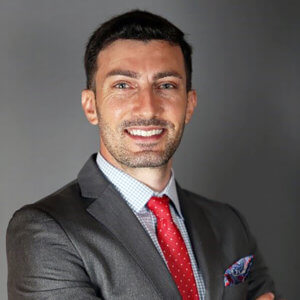 Dr. Joshua C. Gellers, LEED Green Associate, is an Associate Professor in the Department of Political Science and Public Administration at the University of North Florida, Research Fellow of the Earth System Governance Project, and Core Team Member of the Global Network for Human Rights and the Environment. He was also a 2016-17 U.S. Fulbright Scholar to Sri Lanka. In 2015, Dr. Gellers was a Visiting Scholar-in-Residence in Global Environmental Constitutionalism at Widener University Delaware Law School. His research focuses on environmental politics, human rights, and technology. Josh’s work has appeared in numerous peer-reviewed journals and cited in seven UN reports. He runs Enviro Rights Map, a free Google Maps-based website that catalogs constitutional environmental rights throughout the world. Dr. Gellers is the author of The Global Emergence of Constitutional Environmental Rights (Routledge 2017) and Rights for Robots: Artificial Intelligence, Animal and Environmental Law (Routledge 2020). Follow him on Twitter @JoshGellers or visit his website at www.joshgellers.com.
Dr. Joshua C. Gellers, LEED Green Associate, is an Associate Professor in the Department of Political Science and Public Administration at the University of North Florida, Research Fellow of the Earth System Governance Project, and Core Team Member of the Global Network for Human Rights and the Environment. He was also a 2016-17 U.S. Fulbright Scholar to Sri Lanka. In 2015, Dr. Gellers was a Visiting Scholar-in-Residence in Global Environmental Constitutionalism at Widener University Delaware Law School. His research focuses on environmental politics, human rights, and technology. Josh’s work has appeared in numerous peer-reviewed journals and cited in seven UN reports. He runs Enviro Rights Map, a free Google Maps-based website that catalogs constitutional environmental rights throughout the world. Dr. Gellers is the author of The Global Emergence of Constitutional Environmental Rights (Routledge 2017) and Rights for Robots: Artificial Intelligence, Animal and Environmental Law (Routledge 2020). Follow him on Twitter @JoshGellers or visit his website at www.joshgellers.com.
Dr. Stellina Jolly
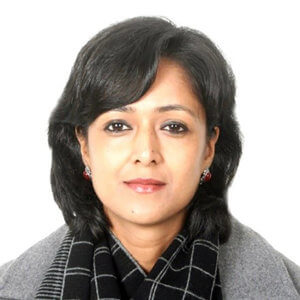 Dr. Stellina Jolly is a Senior Assistant Professor at the Faculty of Legal Studies, South Asian University (SAU), an international organization established by the regional group of the South Asian nations (SAARC). She is a Visiting Senior Research Associate with the Centre for Emerging Countries in private international law at the University of Johannesburg. Dr. Jolly also served as a Fulbright Scholar with the University of San Francisco and was a recipient of the International Visitors Leadership Program (IVLP) research in international environmental law and conflict of laws. She is a member of the IUCN World Commission on Environmental Law and part of the Network of Environmental Champions, Asian Development Bank. She has recently co-authored a book titled ‘Climate Refugees in South Asia: Protection Under International Legal Standards and State Practices in South Asia,’ published by Springer in 2019 and published an edited collection titled ‘Private International Law: South Asian States’ Practice,’ published by Springer in 2017.
Dr. Stellina Jolly is a Senior Assistant Professor at the Faculty of Legal Studies, South Asian University (SAU), an international organization established by the regional group of the South Asian nations (SAARC). She is a Visiting Senior Research Associate with the Centre for Emerging Countries in private international law at the University of Johannesburg. Dr. Jolly also served as a Fulbright Scholar with the University of San Francisco and was a recipient of the International Visitors Leadership Program (IVLP) research in international environmental law and conflict of laws. She is a member of the IUCN World Commission on Environmental Law and part of the Network of Environmental Champions, Asian Development Bank. She has recently co-authored a book titled ‘Climate Refugees in South Asia: Protection Under International Legal Standards and State Practices in South Asia,’ published by Springer in 2019 and published an edited collection titled ‘Private International Law: South Asian States’ Practice,’ published by Springer in 2017.
She has undertaken projects and consultancies with various organizations, including the Rajiv Gandhi Foundation, the European Union, and the International Renewable Energy Agency (IRENA). She has collaborated on many research programs with the Special Centre for Disaster Research at Jawaharlal Nehru University in India. She was awarded an educational grant on Civil Society Law from International Centre for Not for Profit Law (ICNL) and USAID. Dr. Jolly is a resource person for the Ministry of Law, Research Project on Judicial Reforms, and served as a subject expert on international environmental law for India’s government program on developing electronic lecture database resources. She is a Visiting Professor at the Indian Institute of Public Administration (IIPA), Indian Society of International Law (ISIL), and National Law University, Delhi.
Dr. Jae-Hyup Lee
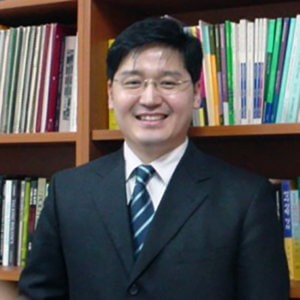 Dr. Jae-Hyup Lee is Professor of Law at Seoul National University. He earned his B.A. in anthropology at Seoul National University, a Ph.D. in American Civilization at the University of Pennsylvania, and a J.D. at Northwestern University in Chicago. He was a Fulbright visiting scholar (2005-2006) and Wallace S. Fujiyama Visiting Professor (2010-2011) at the University of Hawaii Law School.
Dr. Jae-Hyup Lee is Professor of Law at Seoul National University. He earned his B.A. in anthropology at Seoul National University, a Ph.D. in American Civilization at the University of Pennsylvania, and a J.D. at Northwestern University in Chicago. He was a Fulbright visiting scholar (2005-2006) and Wallace S. Fujiyama Visiting Professor (2010-2011) at the University of Hawaii Law School.
Professor Lee has widely published in both Korean and English in the areas of international and comparative environmental law, energy law, and legal anthropology. As a legal counsel to the Ministry of Foreign Affairs and Trade of Korea, he has participated in a number of international conferences and negotiations related to biodiversity, biosafety, climate change, and trade. He frequently advises the Korean Ministry of Foreign Affairs and the Ministry of Environment on climate change and energy issues. Professor Lee is a recipient of the Outstanding Scholarship Award from the Korean Environmental Law Association in 2010. He is currently Editor-in-Chief of the Journal of Korean Law, and the Director of the Center for Energy & Environmental Law and Policy at Seoul National University.
James R. May
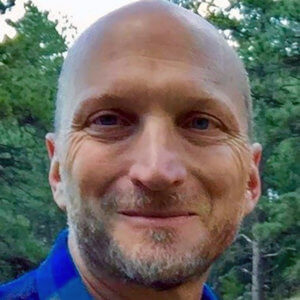 James R. May is Distinguished Professor of Law, Founder of the Global Environmental Rights Institute, and co-Founder of the Dignity Rights Project and the Environmental Rights Institute at Widener University Delaware Law School, where he has served as the H. Albert Young Fellow in Constitutional Law. At Widener University, he has served on the President’s Executive Team, and as inaugural Chief Sustainability Officer, co-chair of the University Sustainability Council, Adjunct Professor of Graduate Engineering, and Phi Kappa Phi inductee.
James R. May is Distinguished Professor of Law, Founder of the Global Environmental Rights Institute, and co-Founder of the Dignity Rights Project and the Environmental Rights Institute at Widener University Delaware Law School, where he has served as the H. Albert Young Fellow in Constitutional Law. At Widener University, he has served on the President’s Executive Team, and as inaugural Chief Sustainability Officer, co-chair of the University Sustainability Council, Adjunct Professor of Graduate Engineering, and Phi Kappa Phi inductee.
May has taught 20 courses, founded or co-founded three law centers, four non-profit environmental organizations and a joint degree program, directed an environmental law clinic, and held numerous visiting appointments, including as faculty at the Pakistan College of Law, Universidade do Vale do Itajaí Brazil, Georgetown University Law Center, University of Pittsburgh School of Law, University of Kansas School of Law, Duquesne University School of Law, National Institute for Trial Advocacy, Paris I Panthéon-Sorbonne University, University of Hawai’i Richardson School of Law, National Judicial College, and Vermont Law School, and as a Fellow of The Environmental Law Institute, Essex University (UK), and University of A Coruña (Spain). May is a former litigator who has prosecuted hundreds of public interest claims in federal court.
May serves as the Special Representative on Environmental and Nature Rights for the International Council of Environmental Law, the Global Pandemic Network, the World Commission on Environmental Law, and the Normandy Chair for Peace. He serves as the Special Representative on Environmental and Nature Rights for the International Council of Environmental Law, and as a member of the Global Pandemic Network, the World Commission on Environmental Law, and the Normandy Chair for Peace. He is an inductee of the American College of Environmental Lawyers, and the Delaware Valley Environmental Inn of Court. He has received awards from the Sierra Club, American Canoe Association, and Pace University, among others. Before lawyering, he served as an engineer in national security and defense.
May is the author of Modern Administrative Law, editor of Principles of Constitutional Environmental Law (2013), and coeditor of Environmental Rights: The Development of Standards (2019) and Shale Gas and the Future of Energy (2016). With Professor Daly, he has also co-authored or co-edited numerous volumes, including the first books on dignity law: Dignity Law: Global Recognition, Cases, and Perspectives (W.S. Hein 2020) and Advanced Introduction to Human Dignity and Law (Edward Elgar 2020), and various titles on environmental constitutionalism: Global Environmental Constitutionalism (Cambridge 2015), Implementing Environmental Constitutionalism (Cambridge 2018), Encyclopedia of Human Rights and the Environment: Legality, Indivisibility, Dignity and Geography (Edward Elgar 2019); Judicial Handbook on Environmental Constitutionalism (3d ed. United Nations 2019); Judicial Handbook on Environmental Constitutionalism: Compendium of Cases (2d ed. United Nations 2019), New Frontiers in Environmental Constitutionalism (United Nations 2016, here), and Environmental Constitutionalism (Edward Elgar 2016)
Dr. Marijana Mladenov
 Dr. Marijana Mladenov is an Assistant Professor at the Faculty of Law for Commerce and Judiciary, University Business Academy in Novi Sad. She completed her basic studies at the Faculty of Law, University of Novi Sad, in 2009. At the same faculty, she defended the master thesis titled, “The right to privacy in the practice of the European Court of Human Rights” in 2010, and completed doctoral studies in 2017 with her thesis, “Right to an adequate environment as a fundamental human right.” In 2009 she was elected for the teaching assistant at the Faculty of Law for Commerce and Judiciary and was promoted to the position of assistant professor in 2017. In October 2018, she was elected to serve as Vice-Dean for International Cooperation at the Faculty of Law for Commerce, followed by her election to serve as Director of the International Relations Office at the University Business Academy in Novi Sad.
Dr. Marijana Mladenov is an Assistant Professor at the Faculty of Law for Commerce and Judiciary, University Business Academy in Novi Sad. She completed her basic studies at the Faculty of Law, University of Novi Sad, in 2009. At the same faculty, she defended the master thesis titled, “The right to privacy in the practice of the European Court of Human Rights” in 2010, and completed doctoral studies in 2017 with her thesis, “Right to an adequate environment as a fundamental human right.” In 2009 she was elected for the teaching assistant at the Faculty of Law for Commerce and Judiciary and was promoted to the position of assistant professor in 2017. In October 2018, she was elected to serve as Vice-Dean for International Cooperation at the Faculty of Law for Commerce, followed by her election to serve as Director of the International Relations Office at the University Business Academy in Novi Sad.
Dr. Mladenov has been professionally involved in several national and international scientific projects. She is a professor at Jean Monnet Module “Application of EU values in the policies of the candidate states,” where she teaches two courses: “Human Rights Protection in the European Union” and “Human rights and climate change within the EU legal framework,” supported by the European Commission (Education, Audiovisual and Culture Executive Agency). She is engaged as a researcher on the international project, “Global Digital Human Rights Network,” organized by the academic network COST, supported by the EU Framework for Research and Technological Development. She is also involved in numerous national projects related to Environmental Law: “Legal and institutional response of the Republic of Serbia to the need for creating a sustainable system of prevention and control of environmental media pollution in the context of joining the European Union,” supported by the Ministry of Education and Science of the Republic of Serbia (2011-2014); “Aarhus Convention within the legal framework of the Republic of Serbia,” supported by OEBS and Administration for Environmental Protection of the City of Novi Sad (2011); “Transposition of the requirements of the Aarhus Convention into the legal system of the Republic of Serbia with special reference to the competence of local self-government units on the territory of AP Vojvodina,” supported by the Provincial Secretariat for Higher Education and Scientific Research (2017-2018); “Obligations of the City of Novi Sad determined by the Law on Environmental Protection and other special laws in this area,” supported by Administration for Environmental Protection of the City of Novi Sad (2018-2019); and “Review of the potential Deposit-Refund System for Liquids Packaging applicable in the Republic of Serbia,” supported by the Ministry of Environmental Protection of the Republic of Serbia (2019).
Dr. Mladenov teaches and writes in the areas of public international law, environmental law, and human rights law. She is the author or co-author of over 40 academic books or articles. She is a reviewer of the journal, Law-Theory and Practice.
Dr. Lina Muñoz-Avila
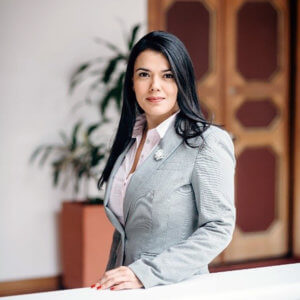 Dr. Lina Muñoz-Avila is a Colombian lawyer. She serves as Director of the Master of Environmental Law and Management program at Universidad del Rosario in Bogota, Colombia, where she also serves as lecturer and advisor to the Environmental Law in the Public Interest Legal Clinic (GAP by its acronym in Spanish). GAP is a legal clinic that litigates human rights protection and public interest cases through constitutional actions in Colombia.
Dr. Lina Muñoz-Avila is a Colombian lawyer. She serves as Director of the Master of Environmental Law and Management program at Universidad del Rosario in Bogota, Colombia, where she also serves as lecturer and advisor to the Environmental Law in the Public Interest Legal Clinic (GAP by its acronym in Spanish). GAP is a legal clinic that litigates human rights protection and public interest cases through constitutional actions in Colombia.
Dr. Muñoz-Avila has been legal advisor for the Ministry of Environment and Sustainable Development of Colombia and consultant to, among others, the United Nations Economic Commission for Latin America and the Caribbean (ECLAC), the World Resources Institute, and the Independent Institute for Environmental Issues of Germany. Beyond doing her Ph.D. in Colombia, she worked in civil society organizations including the Inter-American Association for Environmental Defense (AIDA). She also worked as a doctoral researcher at Getulio Vargas Foundation (Rio de Janeiro, Brazil).
Dr. Muñoz-Avila participated in all the negotiation process of the Escazú Agreement on rights of access to information, public participation, and justice in environmental matters. She also has delivered presentations and participated in academic panels in Latin America, Europe (Universidad Rovira i Virgili, Tarragona, Spain), and the United States, like the 3rd UNITAR-Yale Conference on Environmental Governance and Democracy hosted by Yale Law School. Her areas of expertise are environmental democracy, international environmental law, and the human rights-based approach in climate change and strategic litigation.
She submitted her Ph.D. dissertation in environmental and human rights impacts of large-scale gold mining in Colombia and Brazil at the Law Faculty of the Universidad del Rosario (Bogota, Colombia) where she was a Science, Technology and Innovation Ministry Scholar, and she received Summa Cum Laude recognition for her thesis. Dr. Muñoz-Avila is now completing master studies on climate change economy and law offered by the Latin American Faculty of Social Sciences (Buenos Aires, Argentina) (FLACSO by its acronym in Spanish). Her publishing activity addresses extractive industries, environmental conflicts, the Escazú Agreement, and NDCs. She is a member of the World Commission on Environmental Law, Global Pandemic Network, the International Network on Climate Change, Energy and Human Rights, and the Access Initiative. Follow her on Twitter @linamunozavila and visit www.linamunozavila.com to access her publications.
Dr. Damilola S. Olawuyi
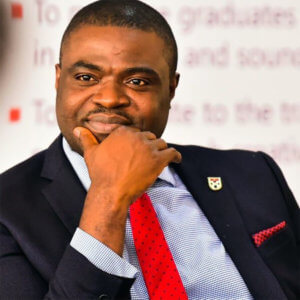 Dr. Damilola S. Olawuyi, SAN is a professor of energy and environment law at Hamad Bin Khalifa University (HBKU) College of Law, Doha, Qatar. He is also Chancellor’s Fellow and Director of the Institute for Oil, Gas, Energy, Environment and Sustainable Development (OGEES Institute), Afe Babalola University, Nigeria. He is an Independent Expert of the African Union’s Working Group on Extractive Industries, Environment and Human Rights Violations in Africa.
Dr. Damilola S. Olawuyi, SAN is a professor of energy and environment law at Hamad Bin Khalifa University (HBKU) College of Law, Doha, Qatar. He is also Chancellor’s Fellow and Director of the Institute for Oil, Gas, Energy, Environment and Sustainable Development (OGEES Institute), Afe Babalola University, Nigeria. He is an Independent Expert of the African Union’s Working Group on Extractive Industries, Environment and Human Rights Violations in Africa.
A prolific and highly regarded scholar, Professor Olawuyi has practiced and taught energy law in Europe, North America, Asia, Africa, and the Middle East. He has served as a visiting professor at Columbia Law School and China University of Political Science and Law, and as a senior visiting research fellow at the Oxford Institute for Energy Studies. He is currently a Herbert Smith Freehills visiting professor at Cambridge University. He was formerly an international energy lawyer at Norton Rose Fulbright Canada LLP where he served on the firm’s global committee on energy investments in Africa. He has delivered lectures on energy law in over 40 countries.
Professor Olawuyi has published close to a hundred articles, book chapters and books on petroleum law, energy and international environmental law. His most recent book publications include Local Content and Sustainable Development in Global Energy Markets (Cambridge University Press, 2021), The Human Rights-Based Approach to Carbon Finance (Cambridge University Press, 2016) and Extractives Industry Law in Africa (Springer, 2018).
Professor Olawuyi serves on the executive committees and boards of several organizations. He is Vice Chair of the International Law Association; co-chair of the Africa Interest Group of the American Society of International Law (2016-2019); and member of the Academic Advisory Group of the International Bar Association’s Section on Energy, Environment, Natural Resources and Infrastructure Law (SEERIL). He is the Editor-in-Chief of the Journal of Sustainable Development Law and Policy. He is a member of the Governing Council of Afe Babalola University, Ado Ekiti, Nigeria, and a Fellow of the Nigerian Institute of Chartered Arbitrators (NICARB).
Professor Olawuyi holds a doctorate (DPhil) in energy and environmental law from the University of Oxford; a master of laws (LL.M.) from Harvard University; and another LL.M. from the University of Calgary. He has been admitted as Barrister and Solicitor in Alberta, Canada; Ontario, Canada; and Nigeria.
In recognition of his “substantial contribution to legal scholarship and jurisprudence,” Professor Olawuyi was awarded the rank of Senior Advocate of Nigeria (Queen’s Counsel equivalent) in the year 2020, aged thirty-seven, therefore becoming the youngest academic ever elevated to the rank of a senior advocate of Nigeria.
Professor Olawuyi is a regular media commentator on all aspects of natural resources, energy and environmental law. Further information about his profile and publications can be found at www.damilolaolawuyi.com.
Dr. Jonathan Scherch
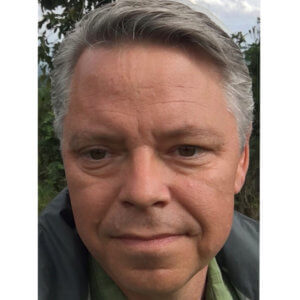 Dr. Jonathan Scherch has served as a Peace Corps Volunteer, founder and executive partner of “triple bottom line” business and NGO ventures, professor and Dean, and a Fulbright Scholar Specialist in a 30-year career of public service, social work, and education. He is Founder and Executive Director of Pacific Bamboo Resources, an international NGO based in Seattle, Washington, and serves as Contributing Faculty for the Social Work PhD / DSW program at Walden University. His teaching and scholarship have focused on topics of international social work practice featuring interdisciplinary approaches to sustainable community and economic development, empowerment, and resilience.
Dr. Jonathan Scherch has served as a Peace Corps Volunteer, founder and executive partner of “triple bottom line” business and NGO ventures, professor and Dean, and a Fulbright Scholar Specialist in a 30-year career of public service, social work, and education. He is Founder and Executive Director of Pacific Bamboo Resources, an international NGO based in Seattle, Washington, and serves as Contributing Faculty for the Social Work PhD / DSW program at Walden University. His teaching and scholarship have focused on topics of international social work practice featuring interdisciplinary approaches to sustainable community and economic development, empowerment, and resilience.
In 1997, Dr. Scherch co-authored the book What Have We Done? A State of the Bioregion Report for East Tennessee and the Southern Appalachian Bioregion, which drew from his own research examining sustainable community development initiatives spanning eight U.S. states. Later, in 2005, at the invitation of the former Prime Minister of the Tibetan Government-in-Exile, he facilitated sustainable agriculture training workshops with officials, farmers and residents of Tibetan refugee settlements in southern India. Subsequently, he produced Sustainability in Exile: Tibetan Farmers Cultivating Compassion, a 2012 video documentary detailing this work. A sabbatical in China afforded opportunities to learn explore topics of regional sustainable development, historical and contemporary practices, and socio-economic and ecological benefits of sustainable bamboo resource systems.
In East Africa, he served as co-PI for “Bamboo ─ Creating jobs, improving livelihoods, saving forests in Kenya”, providing education and training programs to advance women and village empowerment, improved agricultural performance, reduced deforestation via bamboo cultivation best practices, and use of local cook stove technologies along with bamboo charcoal and biochar production. In 2016, he was awarded a Fulbright Scholar Specialist appointment in Kampala, Uganda, within Makerere University’s Department of Social Work and Social Administration. While there, he designed a new international partnership program of Pacific Bamboo Resources, eventually launched as Bamboo for Good (B4G). B4G partners on efforts serving critical needs such as sustainable agriculture and food security, post COVID-19 community / economic recovery, and environmental services of flood / erosion mitigation, and wildlife habitat restoration and protection.
In 2018, B4G received funding to support first-ever programming for community-engaged training in bamboo nursery management and sustainable usage around the critically-impacted Mgahinga Gorilla National Park and Bwindi Conservation Area in Southwest Uganda. Presently, B4G is partnering with the Kibogora Polytechnic University, local governments, and citizens southwest Rwanda on proposed projects of hunger and malnutrition abatement, poverty alleviation, community economic development, and environmental conservation efforts. In July, 2019, B4G was presented to the United Nations High-Level Political Forum on Sustainable Development as a best practice model for advancing and sustaining UN sustainable development goal (SDG) achievements. Previously, B4G was recognized in the 2018 Global Agenda for Social Work and Social Development as “a best practice example of innovation in social work and social development to maintain a balance between humans and the planet.”
Maria Antonia Tigre
 Maria Antonia Tigre is the Director of Latin America for the Global Network for the Study of Human Rights and the Environment (GNHRE). Through GNHRE, she has increasingly focused her efforts on human rights-based climate litigation in Latin America. She is also a coordinator of the human rights group, with a particular focus on ecological rights, for the Global Pandemic Network (GPN), a community of scholars created to debate legal aspects associated with pandemics.
Maria Antonia Tigre is the Director of Latin America for the Global Network for the Study of Human Rights and the Environment (GNHRE). Through GNHRE, she has increasingly focused her efforts on human rights-based climate litigation in Latin America. She is also a coordinator of the human rights group, with a particular focus on ecological rights, for the Global Pandemic Network (GPN), a community of scholars created to debate legal aspects associated with pandemics.
Ms. Tigre is currently finishing her S.J.D. in international environmental law at the Elisabeth Haub School of Law at Pace University. Her research focuses on the current state of global environmental crises and the development of potential new legal solutions through philosophical, religious, and legal arguments. She is the author of Gaps in International Environmental Law: Toward a Global Pact for the Environment (ELI Press 2020). The book is a travaux preparatoires (source of evidence of discussion) for a potential new agreement on environmental principles, which is currently under debate at the United Nations.
Ms. Tigre is the author or co-author of several publications on themes related to Latin American, regional, and international environmental law. Her current research specifically focuses on issues concerning environmental rights and the reshaping of the existing framework of international environmental law. Originally from Brazil, she also researches environmental protection of the Amazon ecosystem, with an emphasis on regional cooperation. Her first book, Regional Cooperation in Amazonia: A Comparative Environmental Law Analysis (Brill 2017). In a TEDx talk, she argued for a regional cooperative approach for environmental protection in Amazonia.
Ms. Tigre has previously worked in the private sector and at the World Resources Institute (WRI). She was a senior attorney at the Environment Program of the Cyrus R. Vance Center for International Justice, where she provided pro bono legal services to NGOs across the globe, especially in issues related to protected areas and the interface between human rights and the environment. Ms. Tigre is a member of the IUCN World Commission on Environmental Law. She holds a dual LL.M. from the Elisabeth Haub School of Law at Pace University (Environmental Law and Comparative Legal Studies), from where she graduated magna cum laude. Ms. Tigre was a visiting scholar at Widener University Delaware Law School and the Maurice A. Dean Law School at Hofstra University. She received her LL.B. from the Pontifícia Universidade Católica of Rio de Janeiro, Brazil.
